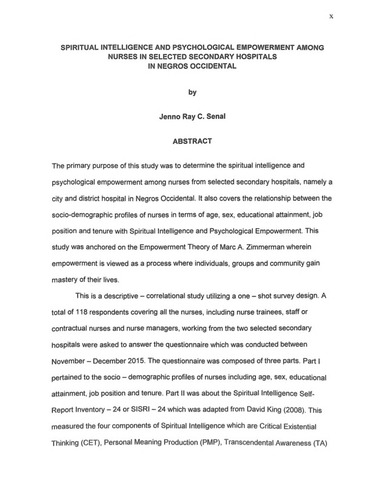Показать сокращенную информацию
Spiritual intelligence and psychological empowerment among nurses in selected secondary hospitals in Negros Occidental
| dc.contributor.adviser | Delicana, Lilia A. | |
| dc.contributor.author | Senal, Jenno Ray C. | |
| dc.coverage.spatial | Negros Occidental | en_US |
| dc.date.accessioned | 2021-06-01T01:58:02Z | |
| dc.date.available | 2021-06-01T01:58:02Z | |
| dc.date.issued | 2016 | |
| dc.identifier.citation | Senal, J. R. C. (2016). Spiritual intelligence and psychological empowerment among nurses in selected secondary hospitals in Negros Occidental (Unpublished Master's thesis). Central Philippine University, Jaro, Iloilo City. | en_US |
| dc.identifier.uri | https://hdl.handle.net/20.500.12852/942 | |
| dc.description | Abstract only | en_US |
| dc.description.abstract | The primary purpose of this study was to determine the spiritual intelligence and psychological empowerment among nurses from selected secondary hospitals, namely a city and district hospital in Negros Occidental. It also covers the relationship between the socio-demographic profiles of nurses in terms of age, sex, educational attainment, job position and tenure with Spiritual Intelligence and Psychological Empowerment. This study was anchored on the Empowerment Theory of Marc A. Zimmerman wherein empowerment is viewed as a process where individuals, groups and community gain mastery of their lives. This is a descriptive - correlational study utilizing a one - shot survey design. A total of 118 respondents covering all the nurses, including nurse trainees, staff or contractual nurses and nurse managers, working from the two selected secondary hospitals were asked to answer the questionnaire which was conducted between November - December 2015. The questionnaire was composed of three parts. Part I pertained to the socio - demographic profiles of nurses including age, sex, educational attainment, job position and tenure. Part II was about the Spiritual Intelligence Self Report Inventory - 24 or SISRI - 24 which was adapted from David King (2008). This measured the four components of Spiritual Intelligence which are Critical Existential Thinking (CET), Personal Meaning Production (PMP), Transcendental Awareness (TA) and Conscious State Expansion (CSE). Responses were made on a 5 - point Likert scale ranging from 0 for not very true of me and 4 which means completely true of me. Part III covered the 12-item Psychological Empowerment adapted from Gretchen Spreitzer (1995). This includes items on the four dimensions of Psychological Empowerment which are Sense of Meaningfulness, Sense of Competence, Sense of Self-determination and Sense of Impact. All the respondents were asked to answer using a 5 - point Likert Scale with 1 for surely disagree and 5 as surely agree. The statistical tools used for descriptive analysis are frequency count and percentage while Gamma, and Cramer’s V for inferential analysis of the relationship between variables. The results revealed that majority of the respondents are females, aged 21 -30 years old, BSN graduate, staff I contractual nurses with less than two years of service with the hospital they are affiliated. A high percentage of nurses have high levels of spiritual intelligence including all of its four components and high levels of Psychological Empowerment as well as its four dimensions. Results also reveal that all socio-demographic profiles of nurses in terms of age, sex, educational attainment, job position and tenure have negligible correlation with spiritual intelligence. This denotes that age, sex, educational attainment, job position and tenure holds no bearing with a nurse’s spiritual intelligence. With regard to Psychological Empowerment, age, educational attainment and job position have substantial correlation while tenure and sex have negligible correlation. In other words, as the nurse grows older, has earned units in MA/ finished his/ her Master's degree, has higher position in the institution and have worked for more years, he/ she has become psychologically empowered making him/ her more productive in the workplace. | en_US |
| dc.format.extent | x, 136 leaves | en_US |
| dc.language.iso | en | en_US |
| dc.rights | Attribution-NonCommercial-NoDerivs 3.0 Philippines | * |
| dc.rights.uri | http://creativecommons.org/licenses/by-nc-nd/3.0/ph/ | * |
| dc.subject.ddc | GSL Theses 610.73072 Se55 | en_US |
| dc.subject.lcsh | Spiritual intelligence | en_US |
| dc.subject.lcsh | Employee empowerment | en_US |
| dc.subject.lcsh | Nurses | en_US |
| dc.subject.lcsh | Philippines--Negros Occidental | en_US |
| dc.subject.mesh | Empowerment | en_US |
| dc.subject.mesh | Nurses | en_US |
| dc.subject.mesh | Spirituality | en_US |
| dc.title | Spiritual intelligence and psychological empowerment among nurses in selected secondary hospitals in Negros Occidental | en_US |
| dc.type | Thesis | en_US |
| dc.description.bibliographicalreferences | Includes bibliographical references | en_US |
| dc.contributor.chair | Somo, Lily Lynn V. | |
| dc.contributor.committeemember | David, Fely P. | |
| dc.contributor.committeemember | Canaman, Jessica B. | |
| dc.contributor.committeemember | Yoro, Carolyn L. | |
| dc.contributor.department | School of Graduate Studies | en_US |
| dc.description.degree | Master of Arts in Nursing | en_US |



